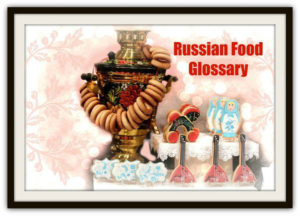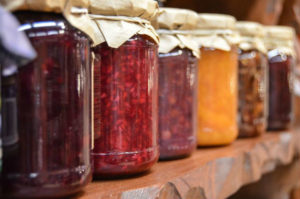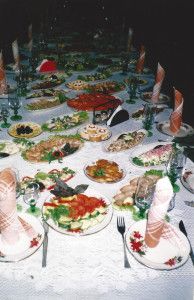Russian Food Glossary – V W X Y Z

The cooking glossary includes Russian food, cooking terms, ingredients, dishes and our people culinary preferences. The glossary includes photos and pronunciation dishes and ingredients in Russian. The idea to add pronunciation of Russian words to my glossary told my American friend and I hope, it is going to help people. I will continue to add new words and descriptions to my glossary.
How to pronounce
Варенье ( Varenya )
Varenya – fruit and berry cooked with sugar to preserve for winter. We use whole berries or large pieces of fruits. Good quality varenya has clear syrup and berries hold a good shape. Varenya can store up to 2 years without any changes in taste. Varenya we use as a sweetener for tea, in baked goods, to flavor water, in desserts and more.
How to pronounce
Вобла ( Vobla )
Vobla – one of most popular Russian dry salted fish. We eat it with beer or without like a snack. Available in Russian stores in the USA.
Vodka – Russian alcoholic beverage. Vodka was called wheat wine at Russia by end of XIX century. Discovery of the beverage related to historical changes in the country and dated between 1446 and 1478 years. If you would like to learn more, I recommend book translated from Russian “A History of Vodka” by William Pochlebkin.
How to pronounce
Винегрет ( Vinaigrette )
Vinaigrette or Vinegret – potato and beetroot Russian salad. Salad can be made with fish, seafood, seaweed and other ingredients. My family favorite is vegetable vinaigrette.
Varenez – made from melted milk by adding cream. Melted milk is baked milk for many hours in oven. Verenez nice to add to coffee or tea. Available at stores in Russia.
Z
How to pronounce
Закуски ( Zakuski )
Zakuski (Zakuscki) – mostly appetizers. The meaning of the word is also for dishes that go well with an alcoholic beverage, mostly vodka. Every holiday meal starts with a variety of dishes call zakuski. Salads, pickled vegetables, caviar sandwiches, meats cuts, cheeses, pickled mushrooms, deviled eggs serve usually on the main table. Some zakuski can also be hot. Hot appetizers serve individually in small dishes.
How to pronounce
Заливное ( Zalivnoe )
Zalivnoe – meat, fish or birds in aspics and decorated with vegetables, boiled eggs. Aspic for good zalivnoe must be very clear. Most common zalivnoe at restaurants beef tongues or osetrina fish (not every fish is good for the dish). It considered a delicacy and served mostly on banquets for Holidays. The zalivnoe dish is the creation of French chefs working in Russia at 19 century. On the photo beef tongue zalivnoe.
How to pronounce
Зефир ( Zefir )
Zefir – Russian sweets similar to marshmallow. The recipe was well adapted from French cuisine. Another version is zefir covered with chocolate. Zefir available in Russian stores in the USA.








